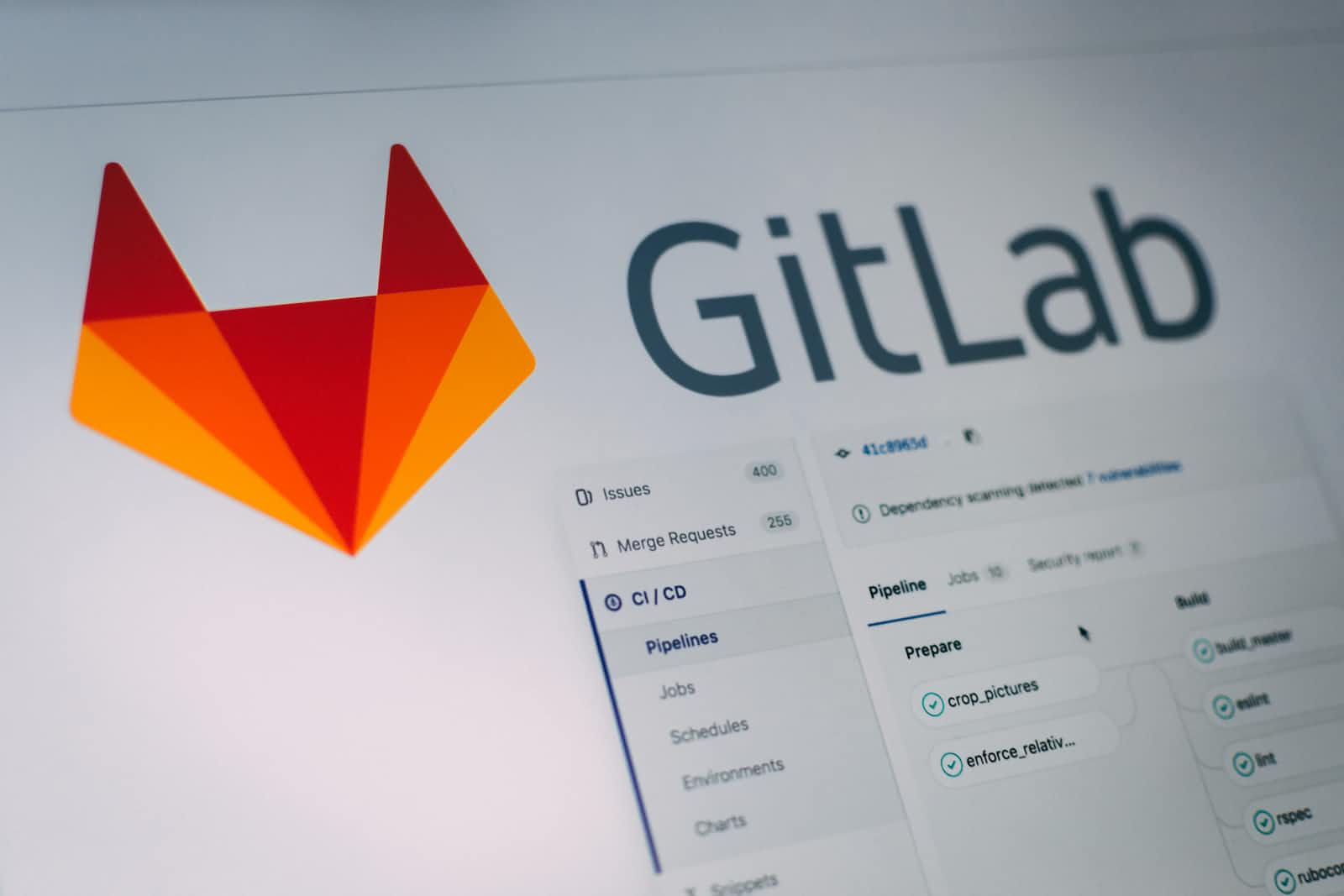GitLab
 Nehal Ingole
Nehal Ingole

Introduction of GitLab
Imagine a world where creating, testing, and deploying software is like building with Legos. Snap together pre-built modules, fit them seamlessly, and see your project come to life in a fun, collaborative way. That's the magic of GitLab!
But GitLab is much more than just Legos for code. It's a one-stop shop for all your software development needs, from version control and issue tracking to continuous integration and deployment (CI/CD). Think of it as your friendly neighborhood DevOps playground, where developers, operations teams, and security experts can all work together seamlessly.
Key Features:
Version Control: GitLab's version control system is built on Git, providing a robust foundation for tracking changes in your codebase. Collaborate seamlessly with your team, manage branches, and merge code effortlessly.
Integrated CI/CD: Automation is at the heart of GitLab's Continuous Integration and Continuous Delivery (CI/CD) capabilities. Automate your build, test, and deployment processes, ensuring a smooth and efficient pipeline from development to production.
Collaborative Planning: GitLab simplifies project management with built-in tools for issue tracking, sprint planning, and collaboration. Keep your team organized, assign tasks, and track progress, all within the same platform.
Container Registry: With GitLab's built-in container registry, managing Docker images becomes a breeze. Store, share, and deploy containers directly from GitLab, seamlessly integrating containerization into your workflow.
Security and Compliance: Prioritize security with GitLab's robust set of security features. Perform code scans, vulnerability assessments, and enforce compliance policies, all within the development process.
Scalability and Flexibility: GitLab adapts to your team's needs, whether you're a small startup or a large enterprise. On-premises or in the cloud, GitLab scales effortlessly to support your growing development initiatives.
Uses Cases of GitLab

1. Team Harmony with Version Control:
Imagine a world where keeping track of code changes, collaborating seamlessly, and avoiding versioning chaos is second nature. GitLab's version control features make this dream a reality. Developers can work in parallel, merge changes effortlessly, and bid farewell to versioning headaches. It's like a well-orchestrated symphony for your codebase!
2. Effortless CI/CD Automation:
In the fast-paced world of development, speed is key. GitLab's CI/CD capabilities automate the build, test, and deployment processes, saving developers precious time and reducing the risk of human error. Whether it's a small tweak or a major update, GitLab ensures your code journeys from development to production with ease.
3. Project Management Bliss:
For teams juggling multiple projects and tasks, GitLab's integrated project management tools are a godsend. Plan sprints, track issues, and collaborate seamlessly within the platform. From ideation to execution, GitLab keeps your team organized and focused on what matters most – building amazing software.
4. Docker Delight with Container Registry:
Containerization is all the rage, and GitLab's integrated container registry takes it up a notch. Manage Docker images effortlessly, share them with your team, and deploy applications with just a click. GitLab ensures that the magic of containers is not just for the experts but for every developer.
5. Fortifying Code with Security Features:
Worried about the security of your code? GitLab's got you covered. Run automated code scans, identify vulnerabilities, and enforce compliance policies directly within your development workflow. With GitLab, security isn't an afterthought; it's woven into the fabric of your coding process.
6. Scaling Success, Your Way:
GitLab is designed to grow with you. Whether you're a solo developer, a startup on the rise, or an enterprise powerhouse, GitLab scales effortlessly. On-premises or in the cloud, GitLab adapts to your needs, providing flexibility without compromise.
Difference in GitHub and GitLab

Certainly! Here's a table highlighting some key differences between GitHub and GitLab:
| Feature | GitHub | GitLab |
| Hosting Type | Cloud-based | Both cloud-based and self-hosted options available |
| Pricing Model | Freemium with paid plans for advanced features | Freemium with additional features in paid plans |
| Repository Support | Git repositories, support for SVN and Mercurial | Git repositories, with native support for Git |
| CI/CD Integration | GitHub Actions | GitLab CI/CD pipelines |
| Container Registry | Docker Hub integration, GitHub Container Registry | Integrated container registry |
| Project Management | Basic project management features | Robust project management tools, including agile planning |
| Security Features | Code scanning, dependency scanning, secret scanning | Comprehensive security features, including code, container, and vulnerability scanning |
| Community Involvement | Large open-source community | Active community with a focus on collaboration and open source |
| Ease of Collaboration | Pull requests, code reviews, discussions | Merge requests, code reviews, integrated communication tools |
| Visibility Settings | Public, private, or internal repositories | Public, private, and internal repositories with additional controls |
| Integrations | Extensive third-party integrations | Integrations with various tools and services |
| Customization | Limited customization options | Highly customizable, especially in self-hosted instances |
| User Interface | Sleek and user-friendly | Intuitive interface with a focus on efficiency |
| Scalability | Scalable for small to large projects | Scalable for various project sizes and complexities |
Whether you're a solo superhero coding in your jammies or a team conquering bugs like a power squad, GitLab can be your ultimate ally. It's more than just a fancy code locker; it's a collaborative playground where ideas morph into software magic. Ditch the workflow juggling and embrace streamlined version control, automated testing, and issue tracking that keeps your team in sync.
Think of GitLab as your DevOps Swiss Army Knife. Slash through bugs with built-in security, deploy code at lightning speed with CI/CD pipelines, and build bridges between developers and operations with seamless collaboration tools.
Sure, other platforms exist, but GitLab's open-source soul, customizable ecosystem, and ever-evolving feature set make it a true contender. So, dive in, explore, and see if GitLab ignites your coding passion. Remember, the only limit is your imagination (and maybe your internet bandwidth).
Ready to unlock GitLab's power? Get started today and say goodbye to development chaos!!!
Stay updated for further blog about GitLab..
Thank you for Reading:)
#Happy Reading!!
Any query and suggestion are always welcome - Nehal Ingole
Subscribe to my newsletter
Read articles from Nehal Ingole directly inside your inbox. Subscribe to the newsletter, and don't miss out.
Written by

Nehal Ingole
Nehal Ingole
🚀 Greetings World! 🌐 Meet a dynamic Frontend Developer, UI/UX Designer, and avid explorer of Cloud & DevOps realms! Uncover the journey of a professional deeply passionate about crafting seamless user experiences, designing visually stunning interfaces, and navigating the cloud with a DevOps mindset. 🔧 Skills Snapshot: Frontend Mastery: HTML, CSS, and JavaScript expert, specializing in React, Angular, and Vue.js. Design Wizardry: Proficient in wireframing, prototyping, and Adobe Creative Suite and Figma for captivating designs. Cloud Maestro: Fluent in AWS, Azure, and Google Cloud Platform, adept at architecting scalable solutions. DevOps Guru: Skilled in Docker, Kubernetes, Jenkins, and Git, contributing to efficient development workflows. 🔗 Let's Connect: Open to collaborating on exciting projects and sharing industry insights, I invite connections for networking or discussions. Reach out for potential collaborations. 📧 Contact Me: GitHub: GitHub Profile Email: nehalingole2001@gmail.com Mobile: 7397966719 Figma: Figma Profile Twitter: Twitter Profile HashNode: HashNode Profile LinkedIn : LinkedIn Profile